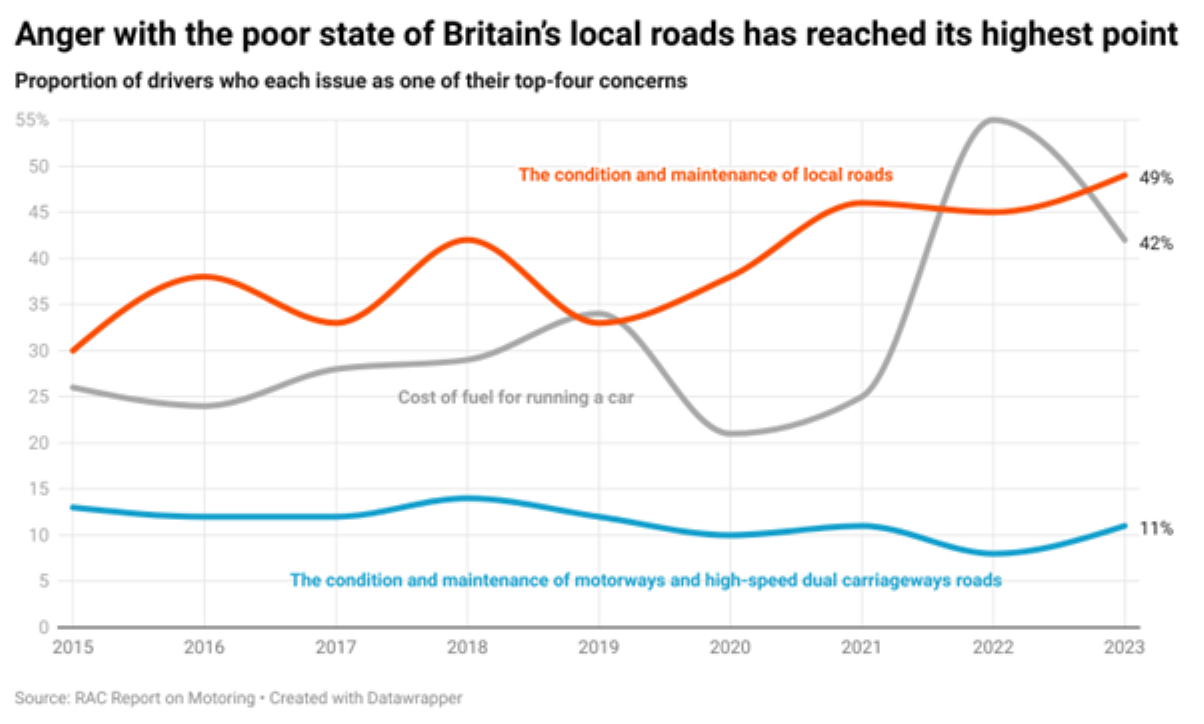Road to rack and ruin
Motorists lament the historic deterioration of Britain's roads
Motorists are calling for more government action to deal with our crumbling roads.
Most drivers believe the poor state of roads has led to them having to take sudden, evasive action to avoid a pothole.
The concerns are highlighted in new research from the RAC.
Avoiding the drop
More than a third (35%) of motorists report they have been forced to swerve quickly to avoid a pothole. It has meant they ended up completely crossing into another lane or going on to the other side of the road during the evasive move.
Seven in 10 (69%), meanwhile, say they have been forced to slam on the brakes in order to drive over a pothole. Furthermore, 37% have tried to maintain a greater distance from the car in front to give themselves more time to react to road-surface problems.
All this has led to public anger levels with the poor state of Britain’s local roads reaching new heights. Almost half of drivers (49%) surveyed for the RAC’s annual Report on Motoring listing it as a top motoring concern. It is now the single biggest issue for motorists by a considerable distance.
Leading decline
The UK has consistently reduced funding of road repairs, and the results are clear for anyone driving or riding on them.
Figures from the OECD – a group of 38 high income countries – show that just £2bn was spent in 2019 on UK local road maintenance compared to £4 billion in 2006 .
Sweden, Denmark, the United States, Japan and New Zealand have all increased spending by around half over the same period.
Countries including France, Finland and Canada have also protected pothole repair budgets unlike the UK Government.
Only Italy and Ireland have seen such similar drops in spending on local roads.
New highs
Concerns had not reached similar heights since 2021, when it was 46%.
The condition and maintenance of local roads is a particularly significant problem for older drivers with 55% of those aged between 45 and 64 saying it is their top concern. This rises to 59% among those aged 65 and older. With the increasing number of older drivers on the road, it means the issue is now a top concern.
The RAC study also reveals that two-thirds of drivers (67%) say that the condition of the local roads they regularly drive on has deteriorated significantly in the past 12 months, up from 60% in the 2022 report, making for the biggest increase since 2017. So, while the pothole issue has regularly. been raised as a concern over the last decade, with the government being forced in to announcements about new funding, the problems are growing with repairs only being short-term, poor quality repairs.
This year only 4% think local road conditions have improved over the last 12 months.

Seeing the signs
While problems with road surfaces are overwhelmingly to blame (cited by 97% of drivers), there are several other immediate factors that are worrying drivers.
The general decline of roads includes faded road markings (61%), litter (35%) and poor signage visibility (34%). Maintenance of basic road furniture, cleaning and clearing vegetation from road signs, repainting road markings and safety aspects such as ‘cats eyes’ and reflective studs, appears to have an all time low. As well as inconvenient, they are quickly becoming a safety issue.
Major issues
Drivers had more positive views about the condition of Britain’s motorways and high-speed dual carriageways. The major route infrastructure in comparison to local roads, is seen a lot more focus from government budgets. However, many are still frustrated by the level of deterioration they have witnessed here too.
This year, 11% of drivers say the condition of these major roads is a top concern, up from 8% in the 2022 report.
Among those who use motorways and other high-speed roads, 44% say their condition has worsened in the past 12 months, up significantly from 38% in 2022.
This deterioration is mainly due to worsening road surfaces (cited by 81%), but faded lane markings (46%), roadside litter (39%) and poor signage visibility (28%) are also to blame.
Government action needed
“We have to bring the ongoing deterioration of our local roads to an end by giving councils the certainty of funding,” states RAC head of policy Simon Williams. “They need to be able to plan proper maintenance programmes which include resurfacing roads that have gone beyond point where they can be patched up.”
The RAC are calling on the Government to “ring-fence 2p from every litre of existing fuel revenues over a five-year period”. It believes this could give councils the funds they need to be able to plan proper maintenance programmes.
Having raised the issue with the Secretary of State for Transport and the Chancellor, Williams says the “£26bn collected from drivers is currently just another form of general taxation”.
“We believe a change in funding strategy is long overdue, not least because England’s major roads receive seven times what local roads are given, despite the fact there are seven times more miles of minor roads.
“It is plain wrong that drivers who contribute billions in tax every year have to put up with roads that are so far from being fit for purpose.”
Cheap not cheerful
Where repairs are being carried out to roads of all types, drivers are wholly unimpressed with the quality of the work done. RAC’s research found 81% unimpressed by the poor quality of repairs. This same proportion (81%) do not believe roads are resurfaced as often as they should be.
The disruption caused by maintenance work is another source of dissatisfaction. Research found 74% of drivers saying they are frustrated by roadworks taking place on the same road in quick succession, while 72% complain that works frequently overrun.
This year’s (2023) edition of the Asphalt Industry Alliance (AIA)’s annual report (ALARM) indicates that local councils face significant shortfalls in the funding. Local government funding from the government has reduced significantly in real terms over the last decade of austerity. It has mean maintenance schedules have been relaxed as well as the number of personnel involved with monitoring and organising work has dropped.
The ALARM report, published in March 2023, says that the total amount of money now needed to address the backlog in road maintenance works has increased to more than £14 billion, up 11% from a year ago.







